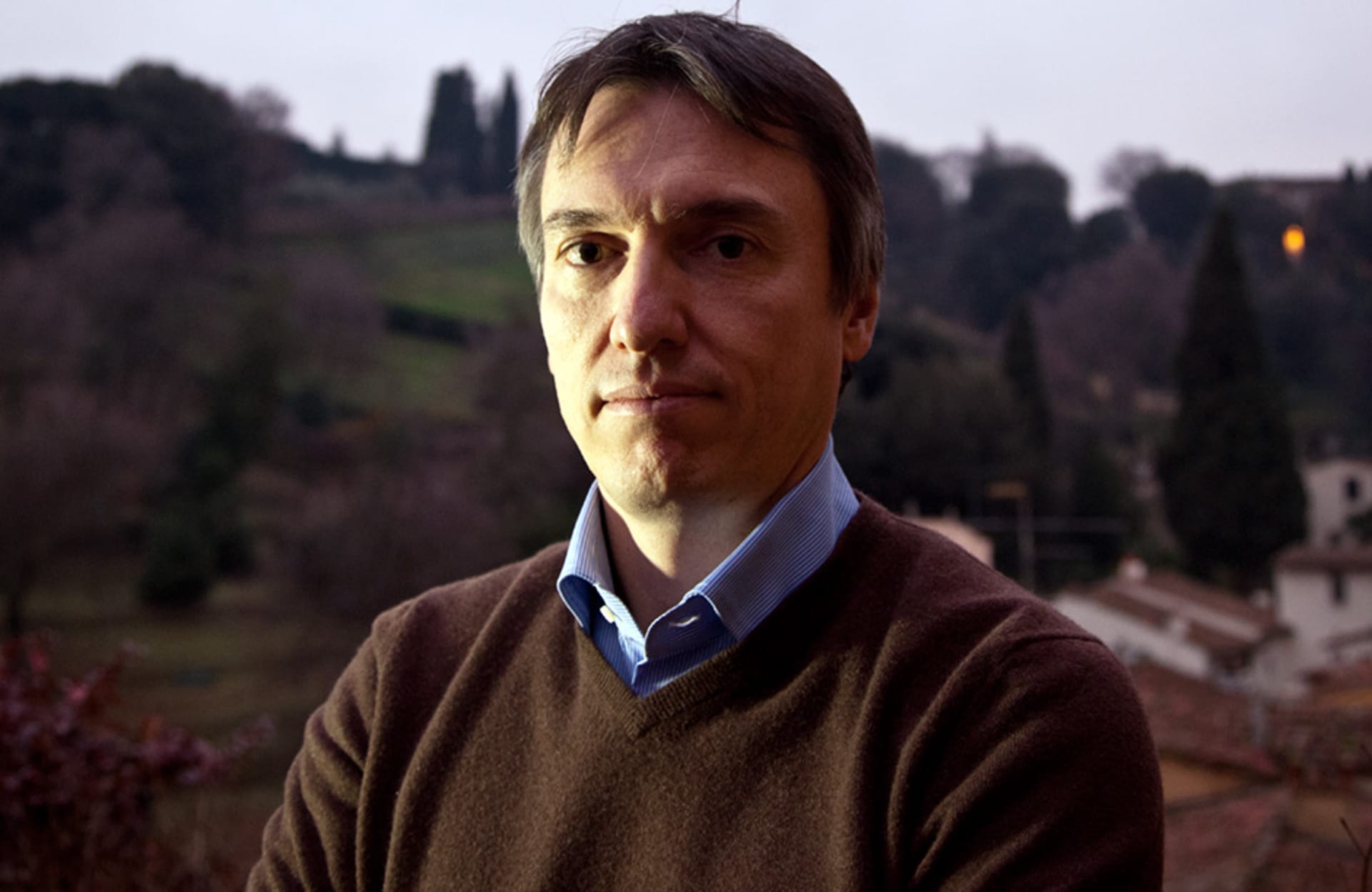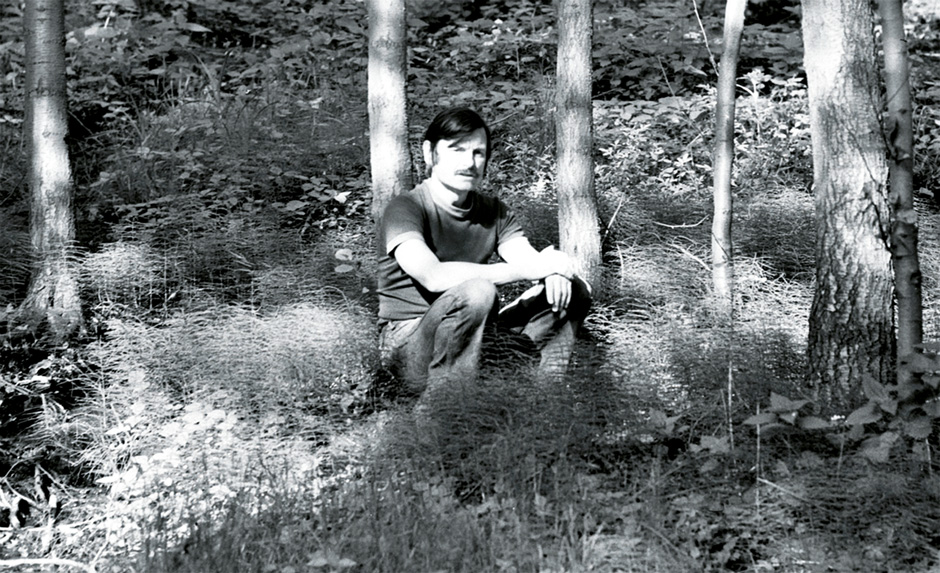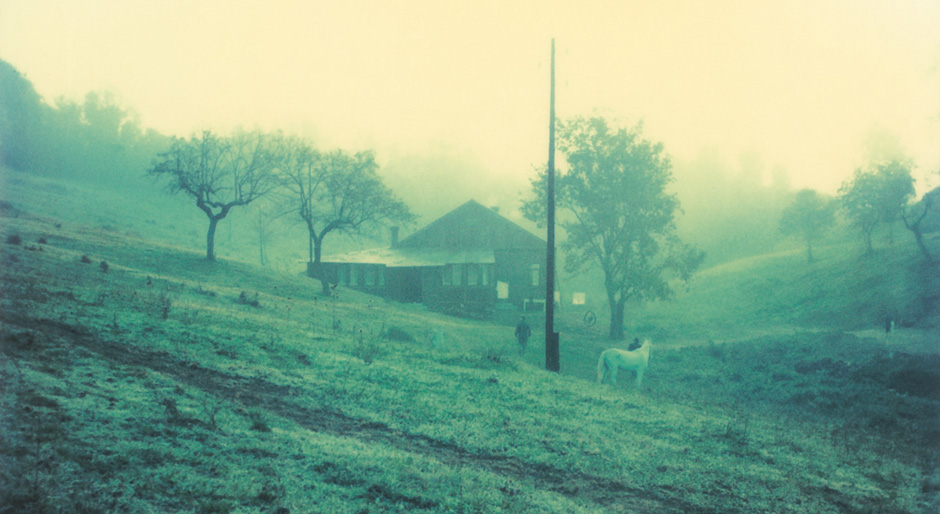
“This is not a coincidence”: Max Dax talks to Andrey A. Tarkovsky
EB’s editor-in-chief visits the Tarkovsky heir and archivist to find out how personal memory and artistic legacy, immortalized on film, have become one. Above: Andrey A. Tarkovsky, photographed in Florence, Italy by Luci Lux.
The recent publication of Life and Work: Films, Writings, Stills & Polaroids (published by Schirmer-Mosel) sees famed Russian auteur Andrey Tarkovsky recast in an increasingly holistic artistic context. The director’s images maintain a singular poetic and spiritual resonance on the printed page—one that his son, Andrey A. Tarkovsky, traces back to his grandfather, the poet Arseny Tarkovsky. Max Dax visited the caretaker of the family archives in Florence, Italy to find out how personal memory and artistic legacy, immortalized on film, have become one.
Mr. Tarkovsky, you come from a family of poets. Your grandfather Arseny Tarkovsky was one of Russia’s most important poets. Your father Andrey Tarkovsky is probably the most poetic director of all times. Do you see yourself in that tradition?
Myself, I am not such a strong or powerful artist. I just love the poems of my grandfather; I think he is one of the greatest poets of Russia. I find his poems and the films of my father very related. When I see the films of my father, I realize how much he tried to incorporate the poems of Arseny into his body of work. In fact, my father wasn’t that isolated—contrary to his image of being a director secluded from the world. His art was always strongly connected not only to Russian cinema, but also to Russian philosophy, poetry and to twentieth century literature, the so-called “Silver Age”. And don’t forget the artists of past centuries. So, I am not surprised to see links to all of the aforementioned in my father’s films.
The Russian literary-philosophical tradition is young compared to its British or continental counterparts.
That’s true. And many philosophers who tried to share their thoughts with the people were then arrested and sent to gulags after the revolution—if they didn’t manage to emigrate. My father was of a later generation, but he had very strong spiritual connections to Dostoyevsky. You see, in Russia, philosophy was always—how can I put it?—impregnated by religion and spirituality. You didn’t have explicitly secular philosophy like in the West. That’s how you can read my father’s work: he never questioned the “given” fact that every art had to be founded in spirituality. My father believed in tradition. He always told me: “You have to learn everything and then you have to forget.” But you have to always keep yourself connected to your culture. That’s why he was trying to give his films their depth and why he was using, for example, music by Bach or images by Brueghel—it was all about providing a historical background to define a solid foundation. A foundation he believed that cinema just was about to lose.
In Russia or in general?
In general. And I doubt that my father could have continued to work in that direction today as cinema has gotten worse.
I had the pleasure of talking to Scott Walker in Paris recently and he said that he was heavily influenced by a couple of films by your father, including Stalker and Solaris. He remembers trying to get tickets for the premiers of both in London, which back in the day was a very big event. He said he couldn’t imagine what film premiere he’d possibly want to attend nowadays.
You are referring to the golden age of cinema, the sixties and seventies. Cinema today is not such an independent form of art like it used to be. My father was struggling to extend that period into the eighties. I have seen Nostalghia recently on the big screen in São Paulo. That film is all about the clash of Eastern and Western culture and about how they could communicate. The film blew me away, once again. And I say this not only because I live, like my father did in his last years, as a Russian in Italy.

Andrey Tarkovsky, photographed by Gueorgui Pinkhassov in 1979
From age eleven you were unable to see your father for more than half a decade because he never returned to the Soviet Union after filming Nostalghia in Italy. When you finally were allowed out of the country to see him in 1986 he was already in critical condition, suffering from terminal cancer. You were fifteen.
Yes, I left the Soviet Union in 1986 to live in Florence, but I don’t feel that I belong to Italy, just as I don’t belong to Russia. I went back to Russia in 1996 and it was a different country. I didn’t recognize it anymore. But compared to me being away from home, my father’s situation was so much more desperate as he was not allowed to travel. He couldn’t see his family. Also, Russians are very bad immigrants. They will never get used to their new surroundings, as these will never become their spiritual home. Have you noticed that Russians always try to recreate a little Russia around them, wherever they go?
That doesn’t sound like such a bad thing.
It’s not! Preserving traditions is certainly a good thing to do. But the more you surround yourself with elements of your home country, the less you will notice about the new world you’re living in. I quickly became fluent in Italian because I came here at a very young age. I have an Italian fiancée. You probably could call me an “assimilated Russian”. But my cultural basis still is Russia. Or to be more precise: it was Russia. The country I hold as a precious memory in my heart doesn’t exist anymore.
It’s the same with Berlin: If you were to visit for the first time after being away for twenty years, you would see that West Berlin and East Berlin have disappeared and a new city called Greater Berlin has taken their place. Regime change does strange things to both geography and psychogeography.
Like in Russia. And I am fully aware of the fact that my spiritual homeland is the same country that made it impossible for my father to live and survive, both financially and spiritually. He basically wasn’t allowed to work in the Soviet Union. But I see the new Russia with even more critical eyes. Before the fall of the Iron Curtain there was the omnipresent big enemy. Everybody could relate to that. But when the Curtain fell, money immediately became the new religion. Greed brought out the worst in every human being living in Russia. I am talking about a very sad development. And this goes as well for the art world. You don’t find spiritual art anymore. My father would have probably faced even more problems within the new system.
But your father actually did finish five great films in the Soviet system.
But don’t forget that these five films cost him twenty-five years to finish! And after Andrei Rublev, none of his films were ever really shown in Soviet cinemas or even in festivals. And if they were screened, it was in secondary cinemas in the outskirts of Moscow, but not in the center where they would have been noticed. He faced terrible problems with Andrei Rublev, which he finished as early as 1966. But the Soviet authorities wouldn’t allow him to screen it until 1971. It is a miracle that the negatives just got shelved away and weren’t washed out.
What do you mean?
Washing out negatives was the usual government practice to get rid of unwanted films. I don’t want to know how many great films disappeared this way. Apart from that, my father had to fight for at least three years for each and every project, which was just dead time. This was a real pity as he was working day and night. He had to shelve a lot of projects just because he wasn’t allowed to work at his own pace. Few people know that he wasn’t a “reflective” or “slow” director. He could have actually made one film every year. He was lucky that his debut film earned him international acclaim. His first film, Ivan’s Childhood, was immediately awarded the Golden Lion in Venice. He became an icon for the freedom of expression in Russia. That’s why they basically couldn’t forbid him to work. But they took revenge by making life as hard as possible for him. And that’s why he left his beloved home country.
While you’re telling this sad story you’re constantly smiling. I don’t understand…
I always smile. It’s life and life only. My father learned to live with that oppression. For him it probably was easier than it would have been for others to be Andrey Tarkovsky. It’s important to realize that during the seventies, the Soviet system wasn’t that strong in an ideological sense. They had just created this insane bureaucracy that slowed everything down. It was an absurd situation. Many of the bureaucrats that were involved in the process actually liked my father’s films. But it was a Sisyphean battle. And everything became worse after Brezhnev’s death in 1982. From then on the cultural life froze and everything became very, very strict. That was the end of artistic freedom in the Soviet Union. They not only forbid him to shoot in Russia; sadly, they even successfully prevented Nostalghia from winning the Palme d’Or at Cannes in May 1983, with the representative of the Soviet delegation actively campaigning against it.

Detail from a Polaroid taken by Andrey Tarkovsky on the set of Nostalghia
The scenes in Nostalghia that reference the main character’s Russian childhood memories were not shot on location?
No, my father had to actually rebuild our Russian country house near a village called Otricoli in Umbria. He wanted an exact replica—which, by the way, took the workers two months to build. He had a Polaroid of the original house, and it looks exactly the same.
Why was it so important to exactly duplicate the house according to the Polaroid? No audience member would ever complain if it wouldn’t have been perfect.
It’s because my father’s films drew from real memories. Nostalghia especially is about losing your home; that is, your home country, which is your spiritual home as well as your physical home. With that film he basically allowed his childhood home to resurface. He’d actually fly my grandmother to the set so she could see the house again. When she saw it, she started to cry, because it was exact.
Memories can be blurry.
That’s why he took Polaroids all the time.
Did you expect to be separated for that long?
No, not at all. When he left us, it was only to shoot Nostalghia in Italy. Nobody could have expected what would happen with the Soviet Union. And still it was a big surprise for everyone—including himself—that he decided to remain in Italy. For me as a child it was a very sad experience. But I try to see it positively. At least I was allowed to spend his last year together with him. We actually never spoke about his sickness as he was hoping until the very end that he would get well again. He basically continued to work on a regular basis until his last breath.
Your father dedicated his last film The Sacrifice to you. In the film, the main protagonist Alexander teaches his son to follow the ritual of watering a dead tree until it will one day grow roots.
My father believed in rituals. When I was a child he would insist the two of us browse through the pages of a book—say, of Brueghel paintings—on a daily basis. It was important to him that I would just see everything he liked with my own eyes. But apart from that, he wrote and read every day himself. He wrote the last chapter of his book Sculpting in Time during the last weeks he lived. He developed the idea of the true artist being some kind of a prophet only during the last days of his life. He talked and talked and talked when the end was near: to his friends, to his co-writers and, not the least of which, to me. In The Sacrifice, Alexander is talking in endless monologues to his son, too. This is not a coincidence. It was my father talking to me.
Didn’t you ever ask him questions?
I always asked him what kind of movies he was watching. I envied him for having seen Star Wars, for instance. I asked him how the film was and he would tell me the whole story, including every little detail. He basically allowed me to see the film in my imagination.
So Andrey Tarkovsky loved Star Wars?
Of course! He then showed me Akira Kurosawa’s The Hidden Fortress, which is, as we all know, the blueprint of Star Wars. In any case, the film we both fully agreed upon was Kurosawa’s Seven Samurai. But more than everything else we talked about dreams. And apart from that we talked about animals and trees. He insisted that I’d remember the name of every tree. I see even more autobiographical details in my father’s last film The Sacrifice than in Nostalghia.
Do you see The Sacrifice as his last will?
In the original script, there was no apocalypse—just the personal apocalypse of Alexander getting cancer and eventually sacrificing everything he owns to keep his health. But when my father realized that the script of The Sacrifice was foreshadowing his life, he rewrote the script. And then he got cancer while shooting the movie nonetheless.
Didn’t your father want you to become a director?
When he died, he put into his testament that I would inherit all the rights to all of his films. So, first and foremost, I am the director of the Andrey Tarkovsky Foundation in Florence and not a film director. I’ve accepted this fate. And of course I am willing to admit that I originally had other plans. It’s true, he did want me to become a director. He had everything planned. Filming and editing seems natural to me. I grew up with it. But it wasn’t meant to be. I did shoot some documentary films though.
You still have time. Claude Lanzmann started directing when he was forty-eight years old.
That’s exactly right. It’s a question of when you are ready to start and nothing else. ~
This text first appeared first in Electronic Beats Magazine N° 33 (1, 2013). Read the full issue on issuu.com or in the embed below.
Published October 29, 2013. Words by Max Dax.
